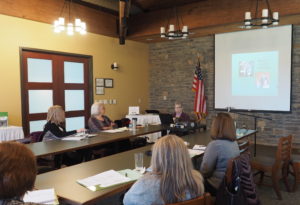By Philis Alvic, Kentucky Craft History and Education Association
This article appeared in the Volume 1, Issue 2 Fall 2019 issue of the Appalachian Curator. Click here to view a PDF of the full issue.
The Kentucky Craft History and Education Association (KCHEA) is an organization founded in 2008 that gathers, conserves, and presents the history and on-going impact of crafts in Kentucky. This mission is carried out in a number of different ways. Saving objects and documents and recording interviews that tell the story of Kentucky crafts is one of the goals of the organization. Bringing awareness of Kentucky crafts to a wide audience is another goal. So, it is very important that collections be accessible.
From the inception of the organization, the board decided that they would not become a museum or archive, but work through institutions already established in Kentucky. In carrying out projects, partnerships have been formed that promote crafts and benefit both groups.
Ensuring that the scholars of the future will have material to reference is a primary objective of KCHEA. To this end, KCHEA has conducted interviews of close to 100 people as part of our Craft Luminary project. Documenting craft history means more than just interviewing craftspeople, it also includes those people prominent in crafts organizations, government efforts, and educational institutions. We have also included collectors of craft objects in our efforts. We desire to represent all aspects of crafts making, promoting, exhibiting, collecting, and selling.
Since we wanted the public to have access to our interviews, we partnered with the Kentucky Oral History Commission (KOHC) of the Kentucky Historical Society (KHS). The original tapes and now the digital files are housed in Frankfort with the KOHC. KCHEA wanted public access to our materials and knew they would get wider exposure through the major state oral history archive. Nearly 60 interviews are available through the KOHC website, with plans to make all of them available
Our interviews are video rather than audio, which presented some problems, due to the large digital files. So, we worked out a system to place compressed files on the Internet and store the larger files on a separate hard-drive available for copy through the Frankfort office of KOHC.
Realizing that researchers prefer to review interview transcripts, KCHEA established a policy to transcribe and index all interviews. A few years ago, an opportunity presented itself with a grant from KOHC to index interviews using the Oral History Metadata Synchronizer (OHMS) developed by Doug Boyd at the Louie B. Nunn Center for Oral History at the University of Kentucky Libraries. This system identifies major topics and then a researcher can go directly to desired place in the interview. This saves time and effort in having to listen to the whole video, when only a particular area of interest is desired.
KCHEA maintains a working list of people that we plan to interview. Although there is some priority given to individuals on this list, age or health concerns may bring someone up to the top. Also, when travelling around the state, if two desired subjects are in the same geographic area, they will be scheduled during the same trip. This list was devised by the KCHEA Board, but there is a process where someone can be suggested for an interview.

We realized that for there to be documents to reconstruct history, someone had to donate them to archives. So, instead of collecting documents ourselves, we set about encouraging organizations and people from the Kentucky crafts world to place their papers into recognized facilities. To this end all the higher education and historical society archives were surveyed to see if they would accept papers of craft activities. All of the state-sponsored universities said, “yes.” Of the private schools, the University of Pikeville and Berea College agreed. The Kentucky Historical Society and the Filson Club assented to collecting. Each institution would, of course, make their own decision for a particular batch of documents. Some archives specified that the entity have geographic or some connection to the institution where they were situated. The reasons institutions declined collecting craft documents were space, their narrow collection policy, or cost.
KCHEA developed a workshop to encourage craftspeople to think about their legacy. Objects are preserved because they are often loved and appreciated. However, we were concerned that the how and why of the creative process would be lost when a craftsperson retired or passed. In the workshop, we talked about what documents and materials a person might save, ways to interview a craftsperson, and placing collections into archives.
If people might be hesitant to approach an archive, we offered to do it for them. Craftspeople seem to be a modest group and often they do not feel they were important enough to have their records preserved. We point out to them, that they might not view themselves as standing out, but they are part of the larger story of Kentucky crafts.
We presented the workshop twice and although attendees praised the sessions, they did not draw many participants. In discussing other ways to present information, we came up with educational videos. Our videographer suggested a series of short videos concentrating on one preservation topic at a time. Each section could be rolled out separately, creating more opportunities for publicity. We are currently waiting on funding to carry out this project.
The KCHEA website documents our activities and makes information available. It carries links to many of our project partners. Many of the video interviews and clips from others are available on KCHEA’s YouTube channel. We do not view our small volunteer board as writing Kentucky craft history, but rather making materials available for writing that history.
Philis Alvic is President of the Kentucky Craft History and Education Association